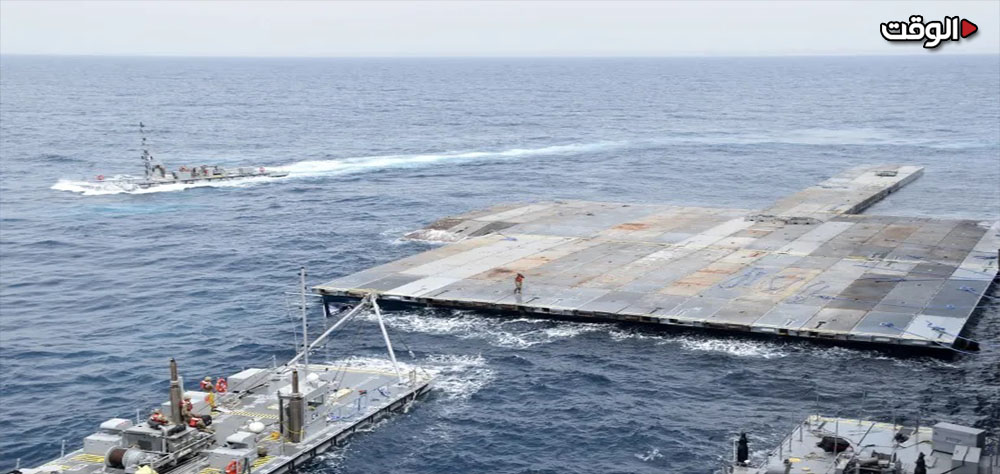Alwaght- Recently, the US Central Command (CENTCOM) announced it constructed a $320 million floating pier for Gaza aid delivery. However, relief groups criticized the project as costly and ineffective, highlighting the ground delivery of aids to Gaza as the most efficient and best way.
How does the pier work?
This project consists of two parts: a sea port that is the first point of entry of aid and a 550-meter corridor that docks to the coast.
Aids will be collected and inspected in Cyprus with the presence of Israeli forces, then they will be transferred to the dock by cargo ships. These aids arrive at the sea port after a 15-hour journey and are unloaded at the floating dock. The aid will then be transported on trucks to the Gaza coast. According to American sources, when this operation is completed, 150 trucks are expected to enter Gaza daily.
Challenges to the project
According to a piece published by the US Navy War College, this pier stops working in extreme weather conditions since the waves reduce the speed of the ships, or winds faster than 24 k/h make it impossible to use the sea structure.
Even earlier this month, CENTCOM had to stop the assembly of the pier due to high winds and wavy seas. The project also requires complex logistics and security with moving parts and details that have yet to be finalized.
Sarah Schiffling, vice president of an institute in the field of humanitarian logistics and supply chain management in Finland, told Al Jazeera that both the cost and the risk of this aid method are very high.
Additionally, it is unclear who is in charge of the aid distribution and who guarantees the security of the relief workers and distribution operations. On Thursday, CENTCOM stated that the UN will receive the aids and coordinate its distribution in Gaza. It did not make it clear whether this method will cover across Gaza.
The Israeli forces several times attacked the aid convoys and workers, and now it is unclear if the relief operation will be granted the guarantee for safe work in the besieged Palestinian enclave. Since the beginning of the war on Gaza, the Israeli army has attacked convoys and sites of aid workers in Gaza at least eight times, and Human Rights Watch says that none of the aid organizations had received a warning before these attacks. Last month, Israel attacked a convoy belonging to the World Central Kitchen Aid Organization that was distributing food in Gaza and killed seven aid workers.
Why is the project controversial?
There has been criticism and opposition to the US move to build a pier for the so-called aid to Gaza. Here are some of them:
Distracting the public opinion from Gaza blockade: Many criticize the US pier as a costly alternative to ground aid. Even some rights groups have said that by building this sea structure, the US tries to distract the public opinion from the more proper and easier way of ground aid delivery to Gaza civilians. This comes as many have called for American pressure on Israel to lift the blockade of Gaza, and perhaps in a way, the launch of the pier can be called a form of an instrument to legitimize the blockade of Gaza. The International Court of Justice accuses Tel Aviv of genocide in Gaza and demands the reopening of more land crossings for Gaza.
Biden's political action: Some voices call the pier construction just a political move by the White House. In the US, there is substantial criticism about Washington's support to the Israeli war crimes in Gaza. So, it seems that President Joe Biden had put this on his agenda to alleviate the public pressure.
In a speech in March, Biden said the seaport would "receive large shipments of food, water, medicine and temporary shelter for war-torn Gaza refugees," a move largely seen as an attempt to placate American public opinion and save the Democratic Party's base in the upcoming presidential elections. At the same time, Washington has provided the Israelis with billions of dollars in aid as well as weapons for their war on Gaza, and building a pier for Gaza at the same time as shipping weapons for the genocidal war on Gaza makes no sense.
Palestinians reject the US move: In the region, especially among the Palestinian resistance factions, there is a pessimism about the performance of the US as the main arms and financial backer of the Israeli government. The Palestinians have called for exit of all foreign forces from Gaza, and it is unlikely that one in Gaza welcomes the US-affiliated forces for aid operations. The barbarous Israeli attacks on Gaza that have already killed over 35,000 civilians, mostly women and children, beside ban on entry of humanitarian aids to Gaza since October has rendered the situation in Gaza catastrophic. Even some Palestinian resistance groups have talked about possibility of targeting the US interests in the site of the pier. Therefore, it does not seem that Palestinian groups are very much receptive of the double-standard US behavior under the ruse of help for Palestine.



























